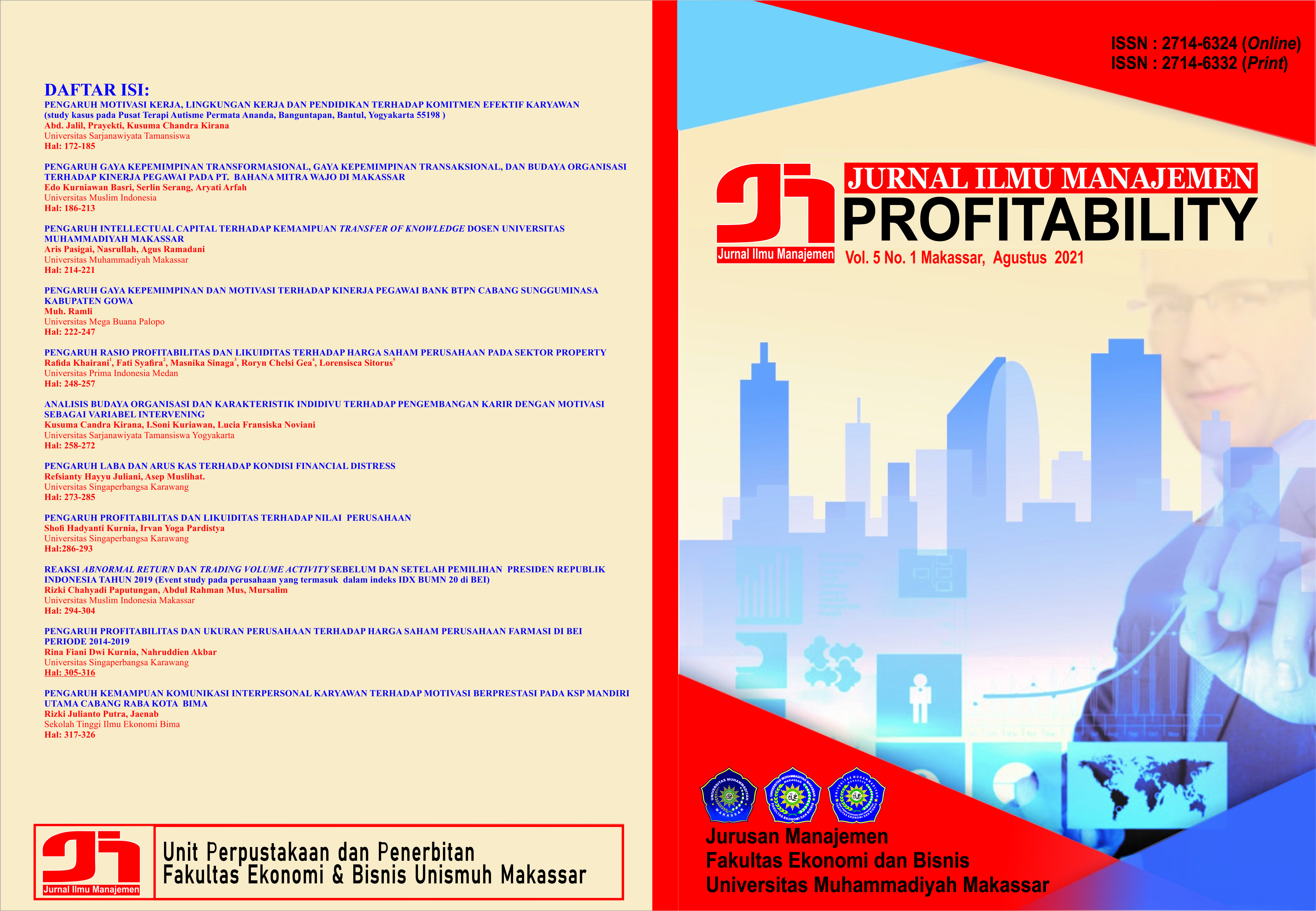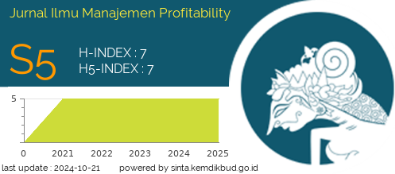THE ROLE OF PERFORMANCE EVALUATION OF WORK DISCIPLINE AND ORGANIZATIONAL CULTURE ON EMPLOYEES PRODUCTIVITY OF GUDEG YU DJUM YOGYAKARTA
DOI: https://doi.org/10.26618/profitability.v6i1.6958
Employee performance evaluation, work discipline, organizational culture, work productivity
Abstract
This study aims to determine the effect of employee performance evaluation, work discipline, and organizational culture on work productivity. The population used in this study are employees who work at Gudeg Yu Djum Yogyakarta. The sampling technique used in this study used accidental sampling. The data were taken by survey using a questionnaire and processed using multiple linear regression analysis. Employee performance evaluation and organizational culture were found to have a positive and significant effect on employee productivity. Work discipline has no significant effect on employee work productivity. Company leaders can improve performance evaluation indicators and culture that is still low to strengthen work productivity.References
Adeyeye, J., Adeniji, A. A., Osinbajo, A. O., & Oludayo, O. A. (2015). Effects of workplace ethics on employee and organisational productivity in Nigeria. International Conference on African Development, 151(1), 267–273.
Arifudin, O., Tanjung, R., Hendar, H., & Hanafiah, H. (2020). Pengaruh penilain kinerja dan kompensasi terhadap produktivitas kerja pada PDAM Kabupaten Karawang. Jurnal Ilmu Manajemen, 10(1), 71–80. https://doi.org/10.32502/jimn.v10i1.2719
Aspiyah, M., & Martono, S. (2016). Pengaruh disiplin kerja, lingkungan kerja, dan pelatihan pada produktivitas kerja. Management Analysis Journal, 5(4), 339–346. https://doi.org/10.15294/maj.v5i4.12712
Ayoko, O. B., Callan, V. J., & Härtel, C. E. J. (2003). The International Journal of Organizational Analysis Article information : The International Journal of Organizational Analysis, 11(4), 283–301.
Chen, S., & Lin, N. (2021). Culture, productivity and competitiveness: Disentangling the concepts. Cross Cultural and Strategic Management, 28(1), 52–75. https://doi.org/10.1108/CCSM-02-2020-0030
Denison, D. R., & Mishra, A. K. (1995). Toward a Theory of Organizational Culture and Effectiveness. Organization Science, 6(2), 204–223. https://doi.org/10.1287/orsc.6.2.204
Dunggio, M. (2013). Semangat disiplin kerja terhadap produktivitas kerja karyawan pada PT Jasa Raharja (Persero) Cabang Sulawesi Utara. Jurnal Riset Ekonomi, Manajemen, Bisnis Dan Akuntansi, 1(4), 523–533. https://doi.org/https://doi.org/10.35794/emba.v1i4.2726
Firmansyah, D., & Mistar. (2020). Pengaruh kedisiplinan terhadap produktivitas kerja pegawai pada Dinas Sosial Kabupaten Bima. Jurnal Dimensi, 9(2), 202–216. https://doi.org/https://doi.org/10.33373/dms.v9i2.2532
Hafid, A. P., Pasigai, M. A., & Rasyid, M. N. (2018). Pengaruh disiplin kerja terhadap produktivitas kerja karyawan pada PT Rakyat Sul-Sel Intermedia Kota Makassar. Jurnal Ilmu Manajemen Profitability, 2(2), 1–10. https://doi.org/https://doi.org/10.26618/profitability.v2i2.1949
Joseph, O. O., & Kibera, F. (2019). Organizational culture and performance: Evidence from microfinance institutions in Kenya. SAGE Open, 9(1), 1–11. https://doi.org/10.1177/2158244019835934
Kelepile, K. (2015). Impact of Organizational Culture on Productivity and Quality Management: a Case Study in Diamond Operations Unit, DTC Botswana. International Journal of Research in Business Studies and Management International Journal of Research In, 2(9), 35–45.
Kurniawan, I. S., & Hamdan, M. (2021). Memperkuat produktivitas: Peran kepemimpinan transformasional dan lingkungan kerja pada PT Naga Semut Kebumen. Derivatif: Jurnal Manajemen, 15(1), 1–11.
Maloba, E. M., Yatundu, F. A., Wanyoyi, K. W., & Mutsotso, S. N. (2016). Analysis of performance appraisal systems on employee job productivity in public Universities. International Journal of Business and Management Invention, 5(9), 1–6.
Pujiono, B., Setiawan, M., Sumiati, & Wijayanti, R. (2020). The effect of transglobal leadership and organizational culture on job performance-inter-employee trust as moderating variable. International Journal of Public Leadership, 16(3), 319–335. https://doi.org/10.1108/ijpl-11-2019-0071
Roelofsen, P. (2002). The impact of office environments on employee performance: The design of the workplace as a strategy for productivity enhancement. Journal of Facilities Management, 1(3), 247–264. https://doi.org/10.1108/14725960310807944
Saha, S., & Kumar, S. P. (2018). Organizational culture as a moderator between affective commitment and job satisfaction. International Journal of Public Sector Management, 31(2), 184–206. https://doi.org/10.1108/ijpsm-03-2017-0078
Sengke, G. (2015). The effect of organizational culture towards organizational performance. Jurnal Riset Ekonomi, Manajemen, Bisnis Dan Akuntansi, 3(4), 587–597. https://doi.org/10.35794/emba.v3i4.11083
Singh, A. (2020). Association between organizational norms and employee productivity in higher education. Journal of Applied Research in Higher Education, 12(2), 271–295. https://doi.org/10.1108/JARHE-01-2019-0014
Sivatte, I. de, Gordon, J. R., Rojo, P., & Olmos, R. (2015). The impact of work-life culture on organizational productivity. Personnel Review, 44(6), 883–905. https://doi.org/10.1108/PR-12-2013-0226
Downloads
Published
Issue
Section
License
Authors who publish with Jurnal Ilmu Manajemen Profitability agree to the following terms:
Copyright of the articles remains with the authors.
Authors grant the journal the right of first publication with the work simultaneously licensed under a Creative Commons Attribution-NonCommercial 4.0 International License (CC BY-NC 4.0). This license allows others to:
Share (copy and redistribute the material in any medium or format)
Adapt (remix, transform, and build upon the material)
as long as they give appropriate credit to the original author(s) and source, provide a link to the license, and indicate if changes were made. Non-commercial use only.
Authors are permitted to:
Distribute their published work (e.g., post it to an institutional repository or publish it in a book), with an acknowledgment of its initial publication in this journal.
Enter into separate, additional contractual arrangements for the non-exclusive distribution of the journal’s published version of the work (e.g., post it to a class website or institutional archive).
For permissions to use the content published in this journal beyond the scope of the license (e.g., commercial purposes), please contact the editorial office via the journal email.
License Details:
This journal is licensed under a Creative Commons Attribution-NonCommercial 4.0 International License (CC BY-NC 4.0).












